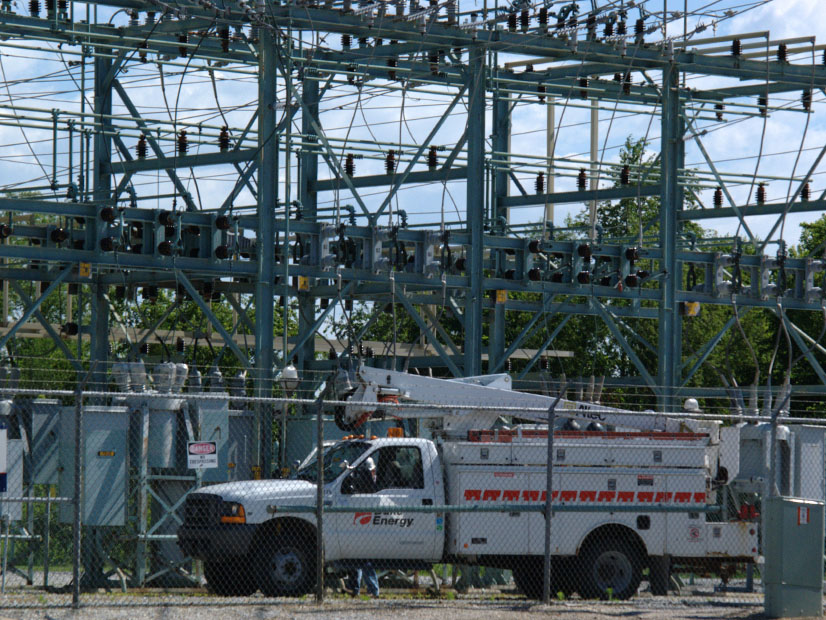
Three men who pleaded guilty Wednesday to conspiring to damage U.S. electric substations hoped to “sow hate [and] create chaos” inspired by “racially or ethnically motivated violent extremist view,” the Justice Department said.
According to a press release, Christopher Cook of Ohio, Jonathan Frost of Indiana and Texas, and Jackson Sawall of Wisconsin each admitted to one count of conspiring to provide material support to terrorists for the purpose of destroying energy facilities. The charges carry a maximum prison term of 15 years.
Prosecutors further recommended a 30-year term of supervised release after the men are released to include the installation of monitoring software on all their computing devices, a ban on the use of encrypted communication platforms and mandatory counseling for violent extremism and mental health. Defendants would also need to clear any new email or social media accounts with probation officers.
As alleged by prosecutors and confirmed by defendants in their plea agreements, the plot began in October 2019 when Frost, age 24, and Cook, 20, met in a chat room.
Because Cook “appeared … to be serious about engaging in action,” Frost suggested they attack power substations across the country with high-powered rifles. By damaging the transformers in the substations, the plotters hoped not only to distract the government and sap its resources in repairing the transformers; they also wanted to spark “confusion and unrest” in the affected regions and possibly even start a civil war.
The conspirators’ plans were reminiscent of the attack on Pacific Gas & Electric’s Metcalf substation in California in 2013, when several gunmen opened fire on the facility, severely damaging 17 transformers. (See Substation Saboteurs ‘No Amateurs’.) The prosecution did not say whether Cook and Frost were specifically inspired by the incident, but the Metcalf attack was mentioned in Large Power Transformers and the U.S. Electric Grid, a publication of the Department of Energy discussing the impact of transformer outages that Frost shared with his fellow planners.
Recruitment Continued Online
As they continued to build their plans, Cook and Frost began to divide the labor, with Cook focusing on recruiting more operatives (seeking younger targets who were “less likely [to be] members of law enforcement”) and Frost taking over the logistical side of the operation.
Cook’s appeals revolved around white supremacist and neo-Nazi ideology, drawing on writers such as James Mason and Alexander Slavros, founder of the far-right message board Iron March. Among the pair’s more ambitious goals for the project was to disable power across the entire country for an extended time, leading to an economic depression that would cause Americans to lose faith in political leaders and inspire new white leaders to rise up and overthrow the system.
Sawall, 22, joined the group in 2019. Already a friend of Cook, he helped with the recruitment effort and also ran the group’s web presence “The Front,” through which he and Cook screened potential new operatives. Those who showed promise were invited to join a more exclusive group called “Lights Out,” dedicated to the planned attack. Specific details of the plan were restricted to yet another forum called “Lights On,” which included only a few people besides Sawall, Cook and Frost. Those other participants have not been identified.
At one point each participant was to recruit and manage a cell of attackers for his region; however, this approach proved “unrealistic,” and the members decided to handle the destruction themselves. Further refinements to the plan included building explosive devices to distract law enforcement during the attack and making necklaces containing suicide pills to be worn by each participant in case of capture.
In-person Meetings Begin
Frost gave the necklaces to Cook and Sawall during a meeting in Ohio, the first time all three met in person. As part of the meeting Sawall and Cook spraypainted neo-Nazi graffiti on a bridge. They had planned to continue painting graffiti, as well as hanging posters and cutting down a telephone pole to raise awareness of The Front, but “these plans were derailed after a traffic stop, during which Sawall swallowed his suicide pill.”
Sawall survived his suicide attempt, while Frost and Cook continued to travel without him. Frost sold Cook a homemade rifle and taught him how to shoot it. The two went to Texas in March 2020 when Frost was on spring break, with Cook planning to recruit contacts he had made in the state. However, one of the contacts lost their phone and couldn’t meet with the pair.
The person who found the phone saw the messages and white supremacist material on it and told the two they were notifying law enforcement. Cook and Frost had several more run-ins with police over their travels, which led them to split up. Cook visited more potential recruits over the next few months in various cities.
Prosecutors did not disclose the circumstances of the group’s arrest, but according to the Milwaukee Journal Sentinel, the FBI’s counterterrorism task force picked up the case after a Canadian man detained for crossing the border with several guns in 2019 told agents he was visiting Cook. Investigators visited Cook, who discussed his political views with the agents. Undercover agents later joined the group’s message boards and surveilled the three men when they met in 2020.
“Those inspired to commit terrorist acts in the name of hate pose a serious threat to our nation,” said J. William Rivers, head of the FBI’s Cincinnati Field Office. “I am thankful for the Joint Terrorism Task Force and our law enforcement partners who work each day to prevent this type of violence from occurring in our communities.”



